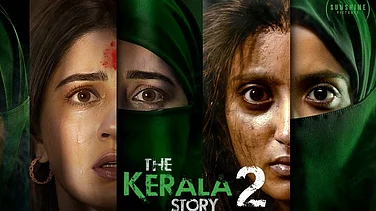In 1978, a film jury presided over by filmmaker Chetan Anand that was responsible for deciding the 26th National Award for Best Feature Film of the Year, watched 80 films before deciding that no film would win the honour that year as none of the films lived up to the “standard of excellence set forth by the jury” and thus not deemed as “worthy” of the prestigious merit. Fast forward to 2023 and the list of this year’s National Award winners would perhaps make the 1978 jury squirm in disdain.
The 69th iteration of the awards ceremony (organised by the Indian government's Directorate of Film Festivals under the aegis of the Ministry of Information and Broadcasting since 1973 after being established first in 1954) saw films like The Kashmir Files, Rocketry, RRR, Pushpa and Gangubai winning awards among others.
National Agenda
The most controversial name on the list is the Vivek Ranjan Agnihotri-directed The Kashmir Files, which won the ‘Nargis Dutt Award for Best Film on National Integration’. The irony of a film that left the nation deeply divided with its (allegedly inaccurate) representation of a disturbing and deeply divisive chapter in the nation's history winning an award for ‘national integration’ was perhaps lost on most.
The ambiguity of the category aside, however, a win for the controversial film perhaps comes as little surprise, especially following the endorsement of the film by various state and political actors. Some BJP-ruled states even made the film tax-free while leaders belonging to the party purchased tickets en-masse and flocked to cinemas like groups of school children out on a picnic. It was said that the film told the “untold” truth about the Kashmiri Pandit exodus from the valley. It is to be noted that the National Award jury ignored the angry views of the Israeli filmmaker Nadav Lapid, who while presiding as chief juror of the International Film Festival of India 2022, in Goa, openly accused the film of furthering anti-Muslim propaganda and raised questions over its inclusion in the festival.
Critics back at home have also slammed the film for its allegedly inaccurate portrayal of the incidents that showcase a dark and complex period in the region’s history that continues to pique emotions and memories. In a foreboding piece for the Time magazine, To Kill A Democracy: India’s Passage to Despotism, Debashish Roychowdhury decried India’s “descent into bigotry” as could be gauged by the rampant promotion and popularity of the film.
Rocketry by actor turned director R Madhavan depicting the life of Indian space man Nambi Narayanan won the Best Feature Film category. With this win, Rocketry and Maddy have become part of a very elite canon of filmmakers and films in India including Satyajit Ray whose five films - Pather Panchali (1955), Apur Sansar (1959), Charulata (1964), Goopy Gyne Bagha Byne (1968), Seemabaddha (1971), and Agantuk (1991) - that won the best feature film award. Or the Kannada filmmaker Girish Kasaravalli who has won the category for films like Ghatashraddha (1977), Tabarana Kathe (1986), Thaayi Saheba (1997) and Dweepa (2002). Other doyens of the ‘Parallel Cinema’ movement who have won the award include Mrinal Sen, Adoor Gopalakrishnan, Mani Kaul and critically acclaimed contemporary filmmakers like Chaitanya Tamhane and experimentalists like Anand Gandhi. These filmmakers are credited with creating a critical culture around cinema in India.
Rocketry’s win can perhaps be explained by the space fervour gripping India at present. An ode to the south at a time when ISRO is winning the moon for India seems more than apt. Soon after the Rocketry’s win, Madhavan was named the head of the Film and Television Institute of India (FTTI) of Pune. Madhavan is known for his support for the Modi government, be it his 2019 rebuttal of a meme shared by Congress depicting PM Modi or his unprompted praise for him on multiple other occasions during the promotions of Rocketry. Agnihotri’s love for the present dispensation is no secret.
Homage seems critical for winnability.
Popular exoticisation
But let not Kashmir Files draw attention away from the other films that won. The rest of the National Award wins also reflect not just the changing politics but also the aesthetics of India, seemingly veering away from glorifying demure and understated realism to brash and loud self-laudation. From stoic academia to colourful song and dance.
Popular southern films and actors won big this year with Allu Arjun becoming the first Telugu star to win the National Award for Best Actor for his namesake role in the viral hit masala film Pushpa.
The international blockbuster RRR won best film in the popular (commercial) film category. Both films have amassed massive viewership, especially abroad, with the latter even scoring at the Oscars. Six National Awards seem only fair. Lagaan won eight, after all. These films, though distinctly different in style, form and content, fall under the same orientalist universe of so-called anti-colonial pop culture cinema that new India (and indeed a large section of white apologists) seems to love. The white man has finally become the butt of his own joke but so has the Indian anti-colonialist catering to neo-colonist guilt. Yay for diversity!
Among actresses, Alia Bhatt and Kirti Sanon have won jointly while, as a bonus win for Kashmir Files, the talented actor Pallavi Joshi has clinched the Best Supporting Actress award. Is a convincing performance in a divisive film worth an award? Perhaps it is up for posterity to decide, just live the final word on the film itself. Gangugbai Kathiawadi, an apolitical film exoticising a slice of life from the past while ignoring the real-life woes of sex workers - won five awards.
At the time of its inception soon after independence, the National Awards (then called State Awards) was born not just with the intent to award aesthetics and technical skill but also to award films with a degree of social relevance. In a diverse and fractured post-Partition nation still emerging out of the shadows of colonialism, popular films were regarded by many early doyens of critical Indian film and art movements as a medium for cultural construction and integration. Perhaps the only film that comes close to this ideal from this year’s winners is the Gujarati magic-realist film Chhello Show by Pan Nalin, India’s official entry for Best International Feature at the Oscars. Even this film, which tells the story of caste discrimination and India’s social realities upon its audience, has been accused by some sections of indulging in the “oppressor gaze” (Similar to criticisms against ‘progressive’, ‘anti-caste’ films like Article 15).
At the end of the day, the National Awards are given by the government bodies and perhaps it is too simplistic to expect them to be fair and free of political influence. And juries in the past have been accused of making biased or influenced decisions as well. In 2005, Ajay Devgn and Kamal Haasan’s performances in “Raincoat” and “Virumaandi” were ignored to give Saif Ali Khan the Best Actor award for 'Hum Tum' which came under criticism as Sharmila Tagore was heading the Censor Board of India at the time. Similarly, Vipul Amrutlal Shah, who produced the contentious and equally divisive 'The Kerala Story' following the success of The Kashmir Files, was the jury chair of the 67th National Awards.
One wonders at a time when the mainstream film industry is so polarised if a film like Rang De Basanti - which was critical of the government’s treatment of martyrs and the death of armed personnel due to state negligence - winning the ‘Popular Film’ category award in 2007 would be possible in today.
While National Awards, especially in the post-IPTA era, have increasingly lost their relevance as a metric for brilliance in film craft, the more recent nominations and wins reflect not just political impact but the overall lack of interest of the state in promoting films that are socially relevant or inculcating an objective culture of art without falling for agenda-driven selections tailored to suit political narratives. At a time when films that are even minutely critical or dissenting are bashed online and face censure from censor boards, awards for neutrality also feel like a far cry.






















